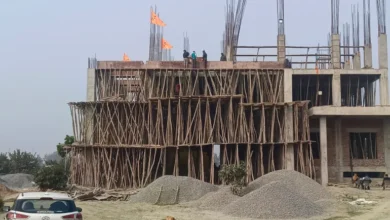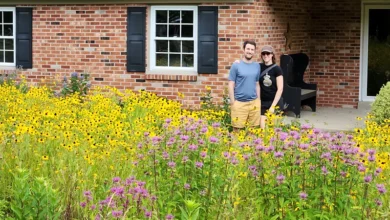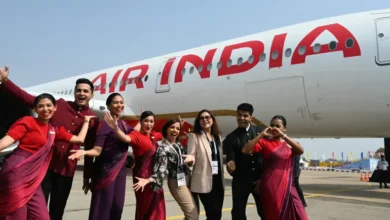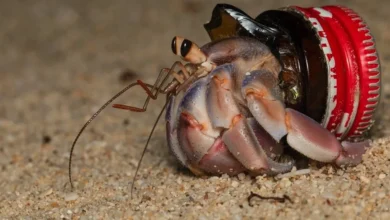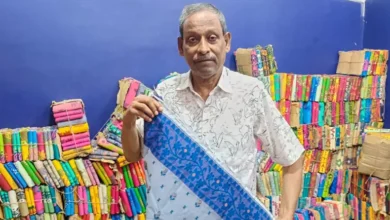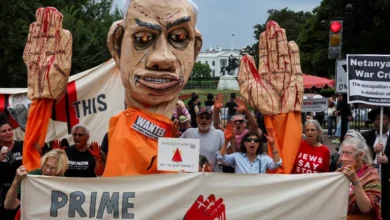Abu Dhabi Stem Cells Center: A shot at life through regenerative cell therapy
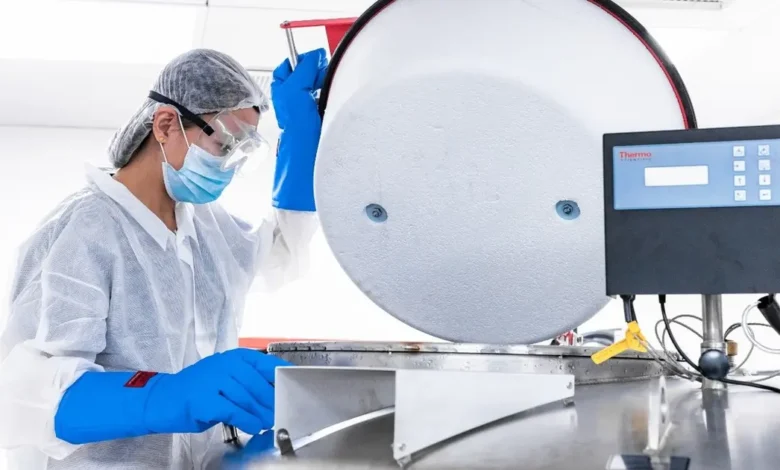
For years scientists and doctors in Abu Dhabi have been harnessing the power of stem cells, the human body’s raw material for repairing itself, transforming different cells into self-renewable treatment that has helped treat an array of conditions, from worn-out knees to infertility, to blood cancer diseases such as leukaemia, for thousands of patients across the country.
It was four years ago, in 2019, that Abu Dhabi Stem Cells Center (ADSCC) was established with the goal of putting the UAE on the map for regenerative medicine.
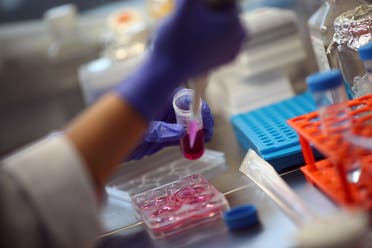
Jump cut to 2023 and scientists at ADSCC are reporting “amazing advances” in stem cell-based therapies, Dr Yendry Ventura, CEO of ADSCC, a PureHealth asset, told Al Arabiya English.
Last November, doctors performed what they said was the region’s first successful bone marrow transplant on a patient with multiple sclerosis. They also used stem cells in a trial branded as ‘UAECell19’ to treat more than 20,000 patients suffering with COVID-19 and long COVID. A progressive form of treatment, known as hematopoietic stem cell transplantation (HSCT), was used to treat hematological malignancies and blood disorders such as leukaemia and multiple sclerosis.
The treatment involves use of chemotherapy to kill the patient’s faulty immune cells and replace them with the healthy stem cells found in the person’s bone marrow to ‘reset’ the system.
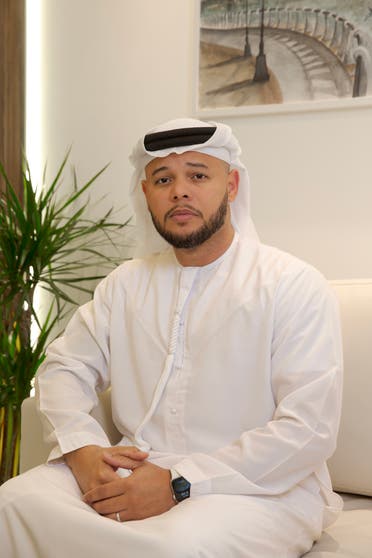
According to Dr Ventura, ten years ago, stem cell technology was hyped as the next potential ‘big thing’ to cure degenerative diseases, but, globally, progressive therapies using the human body’s raw material were slow to develop.
Today, the potential of stem cell treatment is vast, he said. Stem cells, often dubbed the ‘building blocks of life’, can develop into different cell types and can also help repair damaged tissues. They now have the potential to treat cancer and conditions such as diabetes.
“Advancements across stem cell therapies have the potential to revolutionize health care by addressing a wide range of problems,” Dr Ventura said, adding that regenerative medicine offers promising solutions for age-related, disease-induced or trauma-scarred organs and tissue dysfunction.
“This field provides innovative approaches to restore homeostatic balance in chronic conditions that have been resistant to conventional therapies. From orthopedic ailments to complex brain and heart conditions, regenerative medicine demonstrates positive outcomes in disciplines such as orthopedics, hematology, neurology and vascular surgery,” he further said.
Inside the Abu Dhabi center are cutting-edge research and cell processing laboratories, a state-of-the-art apheresis unit, a stem cell collection unit and a Good Manufacturing Practice (GMP) lab. An 85-bed hospital at Khalifa City in Abu Dhabi, with more than 500 employees, which opened last September, now allows physicians and clinicians to practise innovative treatments across specialities, Dr Ventura said.
So far this year, more than 400 patients have received regenerative treatment at ADSCC.
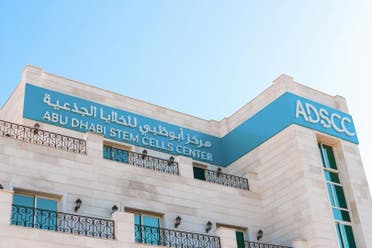
“ADSCC was formed in alignment with the National Agenda for establishing the first stem cell research center in the UAE,” said Dr Ventura. “The center’s holistic approach encom-passes advanced research — running some of the first clinical trials in the UAE – transitional care, manufacturing capabilities and patient care, contributing to Abu Dhabi’s vision as a premier destination for revolutionary health care.”
Since its establishment, ADSCC has gained recognition as a leading institution known for its groundbreaking scientific advancements. The center specializes in advanced stem cell ther-apy, research and regenerative medicine, thereby positioning itself as the leader in medical innovation within the region.
Explaining the efficacy of this treatment procedure, Dr Ventura said that while the applications of stem cell therapy are broad, there are certain conditions that are particularly relevant to the population and health-care landscape of the UAE.
“One notable application of stem cell therapy is in the field of musculoskeletal conditions. For those who lead an active lifestyle in the UAE, conditions such as osteoarthritis and sports injuries are common. Stem cell therapy can be utilized to promote joint regeneration and cartilage repair. By injecting stem cells into the affected joints, the growth of new, healthy cartilage can be stimulated, thereby alleviating the pain,” Dr Ventura said.
Dr Fatima al-Kaabi, the executive director of Abu Dhabi Bone Marrow Transplant (ADBMT) at ADSCC, told Al Arabiya English that ADSCC also serves as the incubator for the Abu Dhabi Bone Marrow Transplant (AD-BMT) program. This was first such initiative in the UAE to provide autologous and allogeneic hematopoietic stem cell transplants (HSCT) for adult and pediatric patients in the UAE. Under this treatment procedure, the first bone marrow transplant was carried out on a patient with blood cancer in 2020.
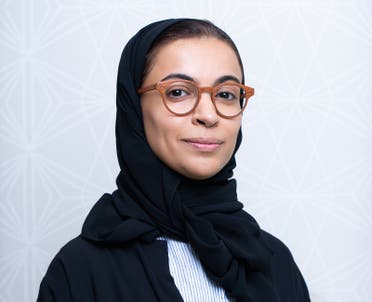
Today, the center employs stem cell therapy across multiple specialities, including orthopedics, men’s health, specifically for erectile dysfunction and Peyronie’s disease, a connective tissue disorder, women’s health for infertility problems, such as ovarian failure and other gynaecological and lung disorders.
Stem cell therapy has also been used for wellness or aesthetic treatments for hair loss, anti-aging and Stem cell IV therapy, or intravenous or stem cell infusion therapy. This is a cutting-edge method of administering stem cells directly into the bloodstream to improve physical health and energy levels. It can also promote emotional and mental wellness by reducing stress and anxiety, improving cognitive function and supporting a person’s overall mood and well-being.
A potential new avenue for stem cell treatment that ADSCC is now exploring is for the treatment of diabetes, a condition that has caused much concern to the UAE and the wider Middle East. The number of people with Type 2 diabetes was set to rise from 529 million in 2021 to more than 1.3 billion in 2050, according to findings published in
The Lancet and The Lancet Diabetes & Endocrinology journals earlier this year. The UAE has one of the world’s highest rates of diabetes, at about 18.7 percent, according to the most recent figures, which project that this could rise to 21.4 percent by 2030.
Dr al-Kaabi said: “Our researchers are looking into the use of stem cell therapy to treat con-ditions such as diabetes in the UAE. Stem cell therapy offers potential avenues for treating diabetes by replacing damaged or dysfunctional pancreatic cells responsible for insulin pro-duction. Our researchers are exploring the use of stem cells to regenerate insulin-producing cells, with the aim of improving blood sugar control.”
He added that stem cell therapy is constantly evolving and ongoing research aims to expand its potential in addressing a wide range of conditions.
Dr al-Kaabi said one of the biggest achievements of ADSCC was during the COVID-19 pandemic, with the development of UAE-Cell19.
ADSCC developed an innovative methodology for autologous non-hematopoietic peripheral blood-derived stem cell therapy (UAE-Cell19) during the COVID-19 pandemic, and was granted a patent by the International Center for Patent Registration of the UAE Ministry of Economy, and three copyrighted Works of Science on cell obtaining procedure, cell charac-terization and treatment recommendations by the European INTEROCO Copyright Office.
In COVID-19 patients, the treatment – which involved extracting stem cells from the patient’s blood and reintroducing them after “activating” them – helped the patient’s body put up a better fight against the virus and minimize its harmful effects.
“This treatment plan was invented by our researchers and physicians in 2020 during COVID-19,” said Dr al-Kaabi.
“It was initially used to treat more than 20,000 COVID-19 patients and has since been employed for treating long COVID or post-COVID-19 complications, including breathing difficulties and fatigue amongst others.”
Additionally, it has shown promise in addressing pulmonary problems among chronic smokers. One notable aspect of this invention is the innovative route of stem cell administration through nebulization,” Dr al-Kaabi said.
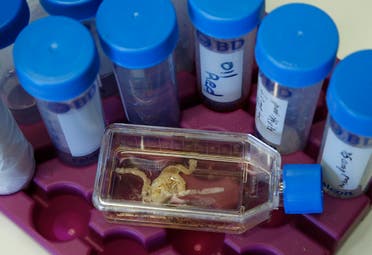
After activation, stem cells are transformed into a fine spray through nebulization and are administered via inhalation by the patient.
This can help regenerate lung cells and improve the body’s immuno-response system by preventing an overreaction to the infection, which can damage healthy cells.
Dr Ventura said ADSCC is also working on advanced cellular therapies, such as CAR-T cells – a treatment for cancer in which a patient’s own cells are engineered to hunt down and eliminate the malignant cells.
“This form of therapy can be further expanded to target specific diseases by programming cells. For instance, adoptive therapy allows for the extraction, multiplication and re-introduction of tumor-infiltrating lymphocytes – cells capable of eliminating a particular type of cancer – and genetically engineered T-cell receptors, providing a powerful tool for combating tumors.”
Dr Ventura said the center’s next goal is to train and develop the next cohort of stem cell experts to ensure Abu Dhabi and the wider UAE continues to gain global traction for its research and treatment of stem cell technology.
“Education is a fundamental pillar at ADSCC. We have established a center for knowledge exchange, where we actively shape and prepare the next generation of health-care profes-sionals, including physicians, nurses and scientists,” Dr Ventura said, adding: “Our panel of physicians and expert scientists, recruited from renowned research entities worldwide, are at the forefront of conducting pioneering clinical studies.”
He added: “Our dedication to pushing the boundaries of scientific exploration and collaboration has allowed us to make significant strides in the complex field of Adoptive Cell Therapy. We remain steadfast in our mission to provide world-class stem cell therapy and regenerative medicine, making a lasting impact on the lives of individuals and contributing to the advancement of health care on a global scale.”

